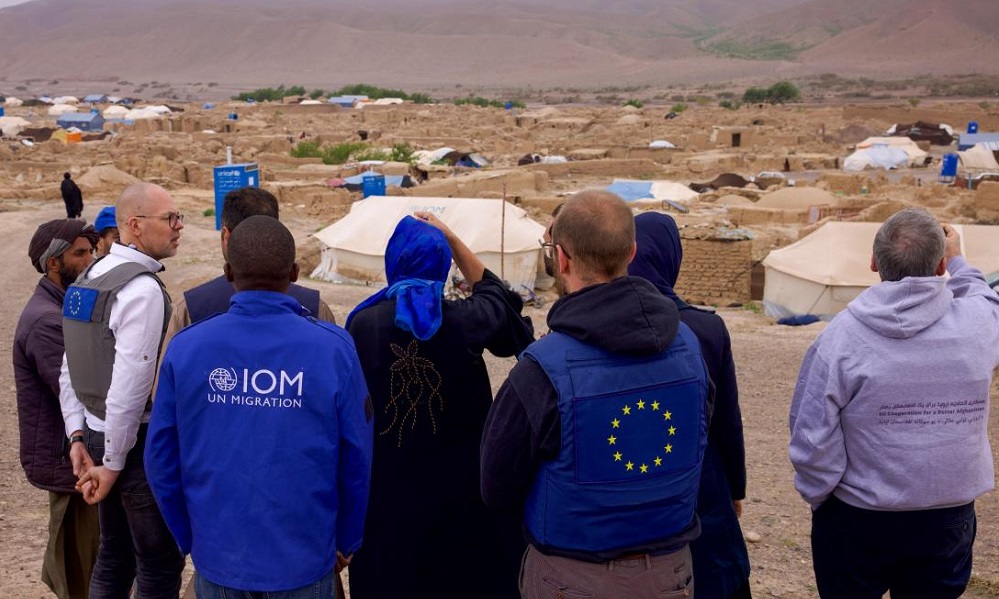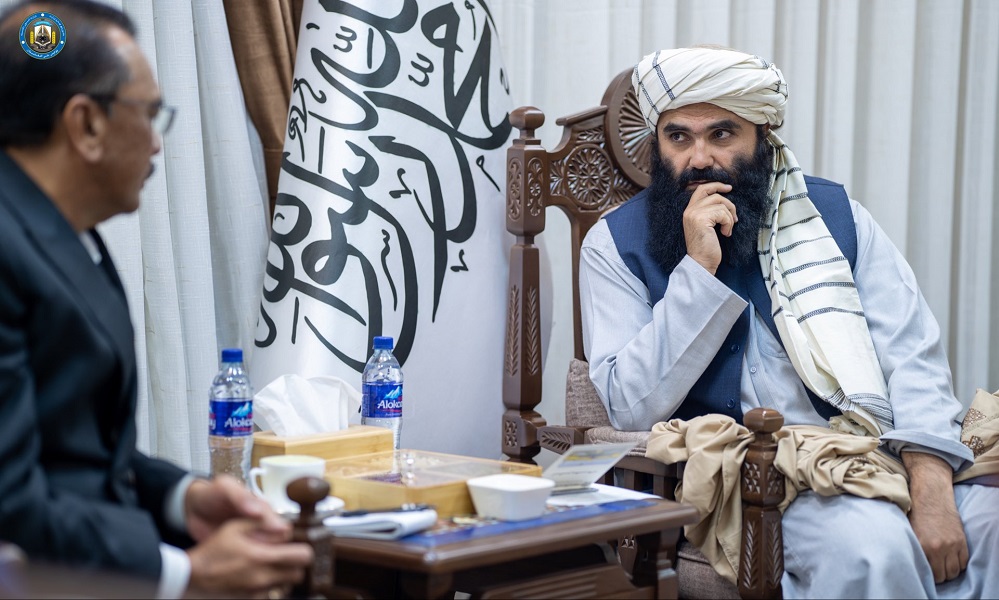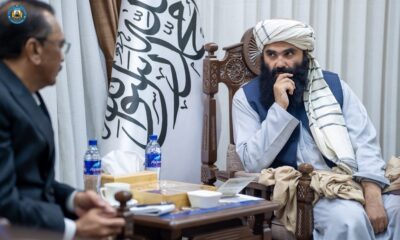Latest News
Pakistan ready to be a partner for peace but will not host US bases: Imran Khan

Pakistan’s Prime Minister Imran Khan has said his country is ready to be a partner for peace in Afghanistan with the United States but that it will not host US military bases.
In an opinion article for the Washington Post, Khan said: “Our countries have the same interest in that long-suffering country: a political settlement, stability, economic development and the denial of any haven for terrorists.
“We oppose any military takeover of Afghanistan, which will lead only to decades of civil war, as the Taliban cannot win over the whole of the country, and yet must be included in any government for it to succeed,” he wrote.
He acknowledged that in the past, Pakistan had made a mistake by choosing between warring Afghan parties, “but we have learned from that experience. We have no favorites and will work with any government that enjoys the confidence of the Afghan people. History proves that Afghanistan can never be controlled from the outside”, he said.
Khan also said that after joining the US effort to bring stability to Afghanistan, his country was targeted as a collaborator which in turn led to terrorism attacks against his country.
He also said that US drone attacks did not win the war but instead created hatred for Americans “swelling the ranks of terrorist groups against both our countries.”
Khan also stated that the United States pressured Pakistan to send its troops into the semi autonomous tribal areas bordering Afghanistan, “in the false expectation that it would end the insurgency. It didn’t, but it did internally displace half the population of the tribal areas, 1 million people in North Waziristan alone, with billions of dollars of damage done and whole villages destroyed.”
He said the “collateral” damage to civilians in that incursion led to suicide attacks against the Pakistani army, killing many more soldiers than the United States lost in Afghanistan and Iraq combined, while breeding even more terrorism against Pakistan.
Khan also stated that there are more than three million Afghan refugees in Pakistan and in the event of another civil war, instead of a political settlement, there will be many more refugees, which will further destabilize and impoverish the frontier areas along the border.
He said that if Pakistan were to agree to host US bases, from which to bomb Afghanistan, and an Afghan civil war ensued, Pakistan would be targeted for revenge.
“We simply cannot afford this. We have already paid too heavy a price.”
He also stated that if the United States, “with the most powerful military machine in history”, could not win the war from inside Afghanistan after 20 years, how would America do it from bases in Pakistan?”
Khan said Pakistan and the US share the same interests – they both want a negotiated peace, not civil war.
He said Pakistan supports an agreement that preserves the development gains made in Afghanistan in the past two decades, economic development, and increased trade and connectivity in Central Asia.
“We will all go down the drain if there is further civil war,” he stated.
According to him, Pakistan has worked hard to get the Taliban to the peace talks table, “first with the Americans, and then with the Afghan government.”
He also said however that Pakistan knows if the Taliban tries to declare a military victory, it will lead to endless bloodshed.
But he said Islamabad hopes the Afghan government will show more flexibility in the talks, and stop blaming Pakistan.
In conclusion he said he believes that promoting economic connectivity and regional trade is the key to lasting peace and security in Afghanistan. “Further military action is futile.”
Latest News
EU allocates 17 million euros to support Afghans on the move

The European Union signed an agreement worth 17 million euros with the International Organization for Migration (IOM) to improve access to basic services, increased economic opportunities and protection for Afghans on the move and their host communities in Afghanistan.
The needs of women and girls are a particular focus of the programme, EU said in a statement released on Thursday.
The statement noted that from January 2023 until April 2024, over 1.5 million Afghans returned from Pakistan and Iran.
“I am deeply moved by the hardship returnees face when being deported to Afghanistan. In a country suffering from poverty and climate change, and in a city that just saw devastating earthquakes, this truly is a crisis within a crisis.”, said Peteris Ustubs, Director for the Middle East, Asia and Pacific of the European Commission’s Department for International Partnerships during the signing ceremony at the IOM transit centre in Herat.
Raffaella Iodice, EU Chargée d’Affaires a.i. to Afghanistan, added “The solidarity of the Afghan people towards their brothers and sisters is an inspiration. We must assure that communities hosting and helping new arrivals are supported. The partnership with IOM ensures access to essential services and provides protection for Afghan returnees and their host communities. As women and girls can be particularly affected, we make sure that all members of society can benefit”.
“IOM’s continued partnership with the EU has been critical in enabling our teams to reach hundreds of thousands of Afghan returnees and other vulnerable communities in the country”, said IOM Afghanistan Chief of Mission, Maria Moita. “Thanks to this renewed commitment, we will be able to focus on addressing the immense challenges in the areas of return and contribute to reintegration, social cohesion, and longer-term solutions for those communities.”
This additional contribution is part of a 5-year programme that is being implemented across Afghanistan and in four countries in the region. It builds on the EU’s previous support to IOM to improve the wellbeing of Afghans forced to return to the country, EU said.
Latest News
Malaysia vows to share its experiences on cyber security with IEA

Acting Minister of Interior Affairs Sirajuddin Haqqani has said in a meeting with a delegation from Malaysia in Kabul that Malaysia is an advanced country and that Afghanistan should use is experiences.
According to a statement released by the Interior Ministry, Haqqani, in the meeting on Thursday, emphasized that security is ensured in Afghanistan and unity among Afghans has been restored.
He stated that the Islamic Emirate wants to have close relations and engagement with the world, especially Islamic countries.
The Malaysian delegation consists of representatives of the Ministries of Interior and Defense, and advisers of the Prime Minister’s Office.
According to the statement, a member of the delegation provided information about Malaysia’s capabilities in cyber security and tackling cyber crime, and said that Malaysia will share its experiences in this field with the Islamic Emirate.
In the meeting, the two sides also discussed the fight against drugs, police training, bilateral cooperation and exchange of experiences between Malaysia and Afghanistan.
Latest News
Girls’ education is a ‘vital issue’ for Afghanistan: Karzai

Former president Hamid Karzai said in a meeting with Iran’s ambassador and special representative, Hassan Kazemi Qomi, that education of girls was a “vital issue” for Afghanistan.
Karzai said he appreciated Iran’s cooperation and its standing with the Afghan people, especially Iran’s contributions to education in Afghanistan.
During the meeting, Karzai said peace and stability in the region are in the interest of all regional countries.
-

 Latest News5 days ago
Latest News5 days agoPakistan’s frontiers minister stresses ‘dignified’ return of Afghan refugees
-

 Latest News3 days ago
Latest News3 days agoRashid Khan named AWCC’s brand ambassador
-

 Regional4 days ago
Regional4 days agoIranian president lands in Pakistan for three-day visit to mend ties
-

 Climate Change5 days ago
Climate Change5 days agoMassive river flooding expected in China, threatening millions
-

 World5 days ago
World5 days agoTwo Japan navy helicopters crash, one body found, 7 missing
-

 Sport4 days ago
Sport4 days agoKolkata beat Bengaluru by one run in IPL as Kohli fumes at dismissal
-

 Sport4 days ago
Sport4 days agoACL: Aino Mina 3-0 Istiqlal Kabul; Attack Energy 3-0 Khadim
-

 Climate Change4 days ago
Climate Change4 days agoRescuers race to reach those trapped by floods in China’s Guangdong
























